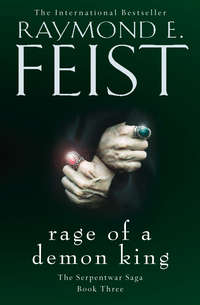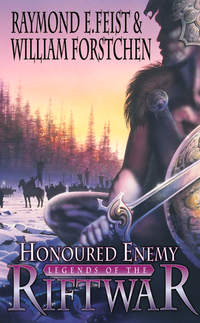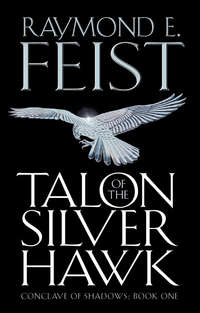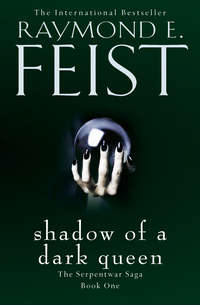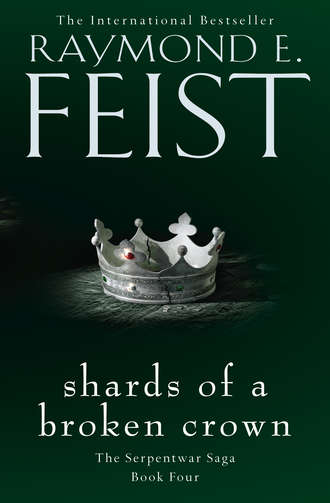
Полная версия
Shards of a Broken Crown
Arutha nodded. His mother, Gamina, was Pug’s daughter by adoption, but he had loved and treasured her as much as he had his son, William. To lose them both within days of one another had been terrible. “I know that it was worse for you, Grandfather. I mourn my parents. You mourn your children.”
Pug said nothing, swallowing hard and gripping Miranda’s hand. Since the end of the war he had been revisited time and again by a wave of profound sorrow and pain, and as much as he hoped for the sense of loss to pass, it didn’t. It grew muted at times, even forgotten for hours at a stretch, but in any quiet, reflective moment, it returned.
Even his marriage to Miranda had been hastily conducted, as if any delay might steal moments away from them. Pug and his new wife had spent as much time together as possible, dealing with the revelations of their past lives and the need to discuss their future. Yet every moment together, no matter how joyous, was overshadowed by the sense of loss, the sense of work yet undone, and the sense that nothing could ever return to them that which was lost.
Pug nodded at his grandson’s words. He sighed. “Arutha, you and I have never had the opportunity to be close. After my first wife’s death I distanced myself from your mother. Watching her grow old was a fate I tried to avoid.” He looked deep into his grandson’s eyes. “There is much of both your parents in you. I know your father trained you from birth to serve, and your life was never your own, but I also know he would have found a less demanding role for you had he found you lacking; you would not be allowed to follow after him had you been less a man than what you are. So, again I say, you must step forward. Patrick may prove a worthy ruler someday, but that day is not here yet. And it has often been our history that one in the role of advisor limited the choices placed before the rulers.” Remembering the rule of mad King Roderic, Pug said, “Perhaps we could have used more of such men in the past.”
Arutha said, “I’ll try, Grandfather.”
Miranda said, “I don’t presume to advise, as I’ve never done well with obeying rulers in my day, but you’ll have to do more than try before we’re done.”
Arutha looked as if he was ready to wilt. “I know.”
A servant announced supper was ready, and they adjourned to the next room. As Pug preceded his grandson, he knew one of the reasons Arutha was so fatigued: from worry over the whereabouts of his own sons.
Jimmy looked around. A series of patrols had been coming through the area for the last two days. They had tried to enter the city and discovered that no one was being allowed through the established checkpoints. Whoever was in charge inside Krondor, General Duko or someone else, had decided that Kingdom infiltration was a serious threat and had sealed the city.
Those mercenaries and traders who had gathered outside the city walls were not troubled, as long as they didn’t cause trouble. A brawl had erupted the night before at a large bonfire some distance away, over a gambling debt, woman, or insult, Jimmy didn’t know, but it had quickly been quelled by a detachment of warriors from the city who rode out and scattered everyone in sight. There had been nothing gentle or orderly about it, a simple raid to disperse, conducted with speed and efficiency. A half dozen men lay dead, while others were moaning and nursing injuries as the strike force returned to the city, but order had been restored. Most of the men outside the walls had come for booty, the opportunity to loot, or to gain steady pay, not to storm a well-fortified city.
Jimmy had judged the city fairly easy to retake should Patrick and his army be sitting outside the walls, but they weren’t. They were in Darkmoor or en route, and by the time they reached Krondor, the fortifications would be reaching daunting proportions. Workers – freemen or prisoners, Jimmy didn’t know which – were up each day at dawn, repairing the damage from the final assault on the city the previous summer.
He had chanced a leisurely ride past the main eastern gates, and saw that they had been successfully replaced. While not as grand as the originals, the new gates looked stout and well crafted. Accomplished carpenters were among those working for the invaders, as most every man of fighting age on the distant continent of Novindus had been pressed into the army.
It was nearly sundown on their second day when Malar asked, “Young sir, are we to find a safe place to sleep?”
Jimmy shook his head. “I think I’ve seen enough outside. It’s time to go inside the city.”
“Forgive my ignorance, but if each gate and breach is manned in the fashion we have observed so far, how do you propose to do this thing?”
Jimmy said, “There are more ways in and out of Krondor than are apparent. My grandfather knew them all, and he made sure Dash and I knew of every one of them before we left.”
“Is your brother likely to find a similar entrance?”
He motioned for his “servant” to follow him, and they walked slowly past a group of sullen-looking fighting men, getting ready to settle in for another cold night around a campfire with little food or prospects. “Knowing Dash, he’s already in the city.”
Dash sat with his back against the dirty stone wall. The other prisoners did likewise. Men crowded together on both sides, but he didn’t object; the weather was still cold and his captors spared no fuel to keep the slave pen heated. He wore only his undershirt and trousers. His boots, jacket, cloak, and all the other possessions he had carried were taken from him.
He had managed to evade the patrol that had followed him and had ridden to the edge of Krondor. There he had found a thriving community of traders, thieves, camp followers, and others assembled outside the gates of the city. The invaders had closed the city to anyone not among their own forces and an odd truce existed along the eastern wall.
With many breaches in the walls, the peace was kept by patrols riding among those gathered outside the walls: a mix of Kingdom deserters, displaced farmers, workers, and mercenaries looking for employment. Among the invaders and Kingdom soldiers no small number of Keshians, Quegans, and fighters from the Free Cities of Natal were in evidence.
Dash had made the mistake of attempting to sneak into Krondor. If a man could enjoy freedom outside the walls, inside the walls only those who had served in General Duko’s army were freemen. He had managed to stay out of sight for a day, but had run into a patrol and while being chased had ducked into a seemingly empty building which in reality had housed a half-dozen armed soldiers who were off-watch. They held him until the patrol caught up and, without even asking his reasons for being in the city, had beaten, robbed, then incarcerated him.
That had been three days before. Dash was letting his bruised and aching body recover; he had no doubt that given half a chance he could escape, and this time he wouldn’t make the mistake of thinking the city was deserted. It wasn’t. In fact, it was turning into something far more lively than he would have thought from Jimmy’s report.
He had spent two days working on restoring a fortification on the north wall. He had tried to overhear the guards’ gossip, but the fact was he could barely understand them. His brother had the gift for language. Dash could speak passable Keshian and Roldem, after having both languages drilled into him as a boy in the King’s court in Rillanon.
But he had barely been exposed to the Quegan, Natalese, and Yabonese dialects which, although descended from Keshian, were almost other languages to his ear. And this common tongue of Novindus was even more removed from Kesh than those.
Still, he was able to judge that something odd was happening or about to happen. The soldiers on patrol and those inside the city seemed as concerned about what was taking place to the north as they were concerned about what might be coming from the east.
“Time to go,” said a voice next to Dash.
Dash nodded to the man as he stood. The man was named Gustaf Tinker, though his last name suggested a grandfather’s trade, for he had been a mercenary soldier from the Vale of Dreams. Dash had found out the first night that most of the prisoners were hapless locals, townspeople, fishermen, and farmers from nearby. Gustaf was something of an oddity, as the Kingdom soldiers had been segregated from the other prisoners. They didn’t get worked, but they weren’t executed either. Dash had no idea what General Duko thought he might do with them; use them for hostages, perhaps. But as a result of the segregation, Gustaf and perhaps one or two others among the fifty or so men herded nightly into a room designed for a half dozen might prove useful allies when Dash made his break for freedom.
Another of the men, Talwin, was almost certainly a thief, but Dash had avoided too much conversation with him. Once into the sewers of the city, a local thief might prove a useful guide, but as long as they shared a cell together, Talwin would just as likely turn Dash in to the guards as a Kingdom spy as not for an extra ration.
The door opened and the men gratefully left the cramped room and shuffled out into the hallway. They were housed in a half-burned tannery in the North Quarter of the city. Most of the rank-smelling businesses – slaughterhouses, dyers, fish mongers, among others – were clustered here, so the area provided two benefits to invaders: large relatively undamaged buildings, and a close proximity to an area of the wall which badly needed repair. In the East Quarter, Dash suspected the workers were being housed in abandoned stables and sheds.
The guard motioned and the first man in line moved out of the hall, into the cold morning light. As Dash came out into the light, he blinked, and was startled to discover the almost ever-present cloud cover had moved inland. The day promised to be warm, which was a mixed blessing. During the day he barely felt the cold, given the amount of work he was required to do, but at least the next night might be more forgiving.
He followed along and waited until the boy who took care of food and water appeared, and as anxious as his companions, he grabbed the single slab of bread offered. It was a coarse and unappetizing meal; the grain was so illground that men had been known to break teeth on husks or small pieces of gravel. The water ration had been cut with a small amount of wine. Some men had come down with the belly flux a day or two before Dash’s capture, and the invaders were certain a little wine kept it from spreading.
All too quickly the morning meal was over, and they were off to work. Dash joined four other men attempting to move a large wall stone that had fallen during the battle of Krondor. They were to get it over to a makeshift crane, built by an invading engineer more adept at engines of war than civil engineering. Yet Dash had seen the wooden contraption lift larger stones several times in the last two days and he was certain that it would continue to serve for a while.
Why was there so much urgency in the rebuilding of Krondor? For Duko to deny the city to Patrick made sense. For Duko to attempt to hold it for any length of time made little sense. Dash smelled a mystery, and as much as he wanted to escape, he also wanted to discover what exactly was taking place around here before doing so.
A man grunted and the stone was lifted; quickly a net was pulled under. Dash used the moment gained while the other men tied off the net to the crane to turn to Gustaf and ask, “You anxious to stick around?”
The soldier, a quiet man of middle build, showed the slight smile which was his most dramatic expression, and said, “Of course. There’s such an opportunity for advancement.”
Dash said, “Yes. Another dozen deaths and you’ll be first in line for bread and water in the morning.”
“What do you have in mind?” whispered Gustaf.
Noticing they were being watched by Talwin, Dash said, “I’ll tell you later.”
Gustaf nodded and made no comment as the crew moved over to repeat their labors with another large stone.
• Chapter Four • Underground
DASH FLINCHED.
The wind had turned cold again after the previous day’s springlike warmth and he was still sporting many bruises, which seemed to sting more when the cold hit them. Still, the exercise seemed to be keeping him from getting stiff. He hadn’t had the opportunity to talk to Gustaf again since he had mentioned the possibility of escape. Talwin had taken to staying close by, a turn of events which worried Dash. He could only guess at the man’s motives; either he was also looking for escape and judged Dash and Gustaf likely allies in such a break, or he was an informer. Dash decided he could spend another day or two trying to discover which.
The guards shouted for the midday break, and the boys with the bread and watered wine hurried through the ranks, distributing their welcome fare. Dash sat down right where he worked, on the next large rock to be returned to the wall, while Gustaf sat with his back to the wall they were repairing. Dash took a bite and said, “Either I’m getting used to this or they’ve found a better baker.”
Gustaf said, “You’re getting used to it. Remember the old saying, ‘Hunger is the best sauce.’”
Dash studied the warrior from the Vale of Dreams. At first it had seemed his entire conversational repertoire consisted of head nods, grunts, and the occasional “yes” or “no.” But since last night he had opened up a little to Dash.
“How’d you get caught here?”
“I wasn’t,” said Gustaf, finishing his meager meal. He sipped his watery wine and said, “I was a guard on a caravan …” He glanced around. “It’s a long story. The short of it is we were intercepted and captured by Duko’s men and those of us who lived through the fight ended up here.”
“How long has it been?”
“Too damn long.” He frowned. “Must be a couple of months now. The days blur. It was snowing when I got here.”
Dash nodded. “Caravan?”
Gustaf shrugged. “My employer wasn’t the only merchant to think he could steal a profit by being the first one bringing goods into the city. From what I’ve seen around here, this general isn’t interested in trading much. He seems willing to let folks fend for themselves on the other side of the wall, but in here it’s a military camp.”
The order to resume work was passed down the line and Dash said, “I get that impression.”
Gustaf smiled. “You’re not as dumb as you look.”
“Back to work!” shouted a guard, and the four men nearest Dash and Gustaf began moving the rock back into place in the wall.
Jimmy motioned with a slight tilt of his head. Malar nodded that he understood and signaled for the boy to come over. The urchin was filthy, covered from head to toe in soot and grime. He smelled as if he had been swimming in a cesspool, and Jimmy thought him a likely source of information.
Malar spoke with the boy for a few minutes, then gave him a coin, telling him to run off. He returned to where Jimmy leaned against the wall in a pose of indifference and said, “Young sir, the boy was, indeed, working in the sewers. They pay him to crawl into the smaller culverts and pipes, ridding them of burned wood, mud, and the like.”
Jimmy shook his head slightly in irritation. “Damn. What are they doing down there?”
In a low voice, Malar said, “Apparently repairing the sewer, much as they seem to be repairing everything aboveground on the other side of the wall from all reports.”
“But why?” asked Jimmy rhetorically. “The sewers are sufficient for his army. With a little work, he can keep them flowing enough so his men don’t fall ill.” Jimmy scratched an imaginary itch on the side of his face. “But from what we’ve heard, he’s trying to put them back to the state they were in before—” He had been about to say before “Grandfather blew up the city,” but changed it to “the city was taken.”
“Perhaps this General Duko likes things orderly.”
Jimmy shook his head in baffled silence. He had read every report that had reached Darkmoor on the enemy before and after the Battle of Nightmare Ridge.
Duko was probably their best field general, and third in importance after Fadawah and Nordan. Jimmy couldn’t begin to guess what he was up to. Had he been fortifying the city for an attack from the east or south, that might have made some sense, though the defenses would still be less than ideal when Patrick’s army arrived.
Had he continued to rip Krondor apart, adding to the destruction – to deny it to the Kingdom – would have made sense. But repairing the damage done, as if he was going to occupy the city for a long time, that made no sense.
“Unless …” said Jimmy softy.
“Young sir?” asked Malar.
“Never mind.” He looked around. “It’s going to be dark in the next hour. Come with me.”
He led Malar through the busy streets in the tent city and toward an alley, really just a passage between freestanding walls, all that was left of two businesses. He ducked into the alley without waiting to see if he was being watched, and heard Malar follow.
It would be easy to become lost in Krondor, Jimmy knew from his last visit. With all the destruction, landmarks didn’t exist. Yet the patterns were the same, and if one constantly remembered where one was relative to one of the few intact recognizable features in the city, it should be possible to find one’s way. At least Jimmy hoped this was so.
He heard movement before he saw it, and ducked back, almost knocking Malar over. Someone walked along the abandoned street, coming closer. Jimmy and Malar hunkered down, fading into the darkness between the walls.
Shortly, a pair of armed men hurried by, upon what errand Jimmy could only guess. Jimmy waited, to see if they returned or if others followed. When no one else appeared after a few minutes, he moved across the road to a burned-out inn.
Hunkering down behind a section of still-standing wall, Jimmy whispered, “This inn has a Way into the sewers. If it’s not blocked, and if the sewers are still intact, we can get inside the city. Most of the sewer is cut off from out there to in there,” he said pointing toward the city, “but there is an old collapsed wall of a cistern that we can wiggle through.”
“Is that a good idea, young sir?” asked Malar. “From what we’ve heard it seems difficult to remain inside without being pressed into a work gang. At least that seems the general opinion.”
“I don’t plan on being seen,” said Jimmy. “You’re free to make your own way from here on, if you choose.”
“Living by my wits is an old habit of mine, young sir, but I suspect you and your brother are my best opportunity to find something beyond that.” He studied Jimmy for a moment, as if weighing risks against possible rewards, then said, “You and your brother are two men of some position, I suspect. If so, and if I serve you to a good ending, then perhaps I may salvage something from what has so far been a horrible turn of fate.” He fell silent for a moment again, then said, “If you will have me in your service, I will go with you.”
Jimmy half shrugged. “I guess that makes you my servant in fact, then. Tell you what you must do. Should anything happen to me, return as best you may to the East. Long before you reach the Kingdom Army you will almost certainly be apprehended by Kingdom advanced scouts. Probably Hadati hillmen or Krondorian Pathfinders. If it’s Hadatis, see if there’s a man named Akee with them. If Pathfinders, ask for Captain Subati. Have either of those men take you to Owen Greylock or Eric von Darkmoor and tell them everything you’ve seen so far. Without a name, you’ll be taken for a Keshian deserter or looter or something, and it might be a long time before anyone heard your story. And they must know what we’ve seen.”
“But what have we seen?” said Malar, genuinely perplexed.
“I’m not sure, which is why we must get inside the city. But whatever it is, it’s not something we anticipated.”
“That’s bad.”
Jimmy grinned. “Why do you say that?”
“Because the unanticipated is always bad.”
Jimmy’s grin broadened. “Always?”
“Always. There is no such thing as a pleasant surprise.”
“I remember this girl once—”
“Did she end up breaking your heart?”
Jimmy nodded with a smile now rueful. “That she did.”
“You see. If you can anticipate, you can stay beyond harm’s reach.”
“You sound like a man of experience,” suggested Jimmy.
Malar’s eyes narrowed. “More than most men know, young sir.”
Jimmy looked around. The shadows had deepened as the sun had lingered in the west, and now the sky above was turning a stunning shade of violet as night approached. “It’s dark enough we won’t be noticed, I’m thinking.” He led Malar into the rear of the old inn, having to carefully pick his way across a section of timbers, what was left from a collapsed doorway and wall section, as well as part of the ceiling above. The roof was gone, and blackened timbers above showed starkly against the darkening sky. They moved cautiously, then Jimmy said, “It’s around here somewhere.”
He knelt and looked around. He moved some smaller debris covered in thick soot, raising a stench of wet charcoal. “Some of the wood is rotting.”
Malar said, “There is a ring of iron there, young sir.”
“Give me a hand,” said Jimmy as he cleared the top of the trapdoor.
As the two men pulled, Jimmy said, “This used to be the back room at an inn controlled by the Mockers.”
“Mockers?”
“Thieves,” said Jimmy. “I thought their fame reached into the vale.”
“The only thieves with whom I had contact were those who used quill and parchment, not dagger and guile. Businessmen.”
Jimmy laughed. “My brother would agree; he used to work for the worst of the lot, Rupert Avery.”
“That’s a name I have heard, young sir. My late master had cause to curse him more than once.”
They got the trap moved and swung it back, letting it fall. The opening yawned at them like a black pit. Jimmy said, “I wish we had some light.”
“You expect to travel in such gloom?” said Malar, a note of incredulity in his voice.
“There is no light on the brightest day down there.” He found what he was looking for, the ladder down, and as he swung himself down onto the topmost rung, he said, “There are lights down there if one but knows where to look.”
“If you know where to look,” Malar muttered under his breath.
They carefully descended into the darkness.
Dash winced, but not from the cold; rather he flinched at the sound of a lash striking a man down below. He, Gustaf, Talwin, and a few other men he had come to know were laboring atop the wall just to the north of Krondor’s main gate. Dash glanced over at Gustaf, who nodded, indicating everything was all right. Suddenly they both turned. A man screamed a few yards off as he lost his footing; in that brief instant, the man knew with dread certainty he was going to fall and no amount of will or prayer would keep him alive. His anguish and terror filled the afternoon air as he toppled sideways and fell to his death on the cobbles below. Gustaf flinched at the sound of the body striking the unyielding rock. They were repairing the battlements and the footing was treacherous, made doubly so by loose stones and constant fog in the mornings and evenings.
“Keep your wits about you,” said Dash.
“You don’t have to tell me that twice,” said Gustaf.
Dash chanced a look over the wall and saw the usual confusion of the foulbourgh, soldiers milling around, street vendors, and the other human flotsam drawn into this eddy of the previous year’s war. Somewhere out there, he fervently wished, his brother Jimmy was getting the information needed to alert Owen Greylock that something strange was taking place in Krondor.
Given the lack of resources, General Duko was doing an admirable job of restoring the city to its earlier status, at least from a military point of view. The merchants and other residents of Krondor would see years pass before the city came close to returning to its former prosperity. Too much damage had occurred for that to be anything but a distant dream. But from a soldier’s point of view, Krondor would be close to its previous level of defensibility in less than a year’s time, perhaps as quickly as nine or ten months.


